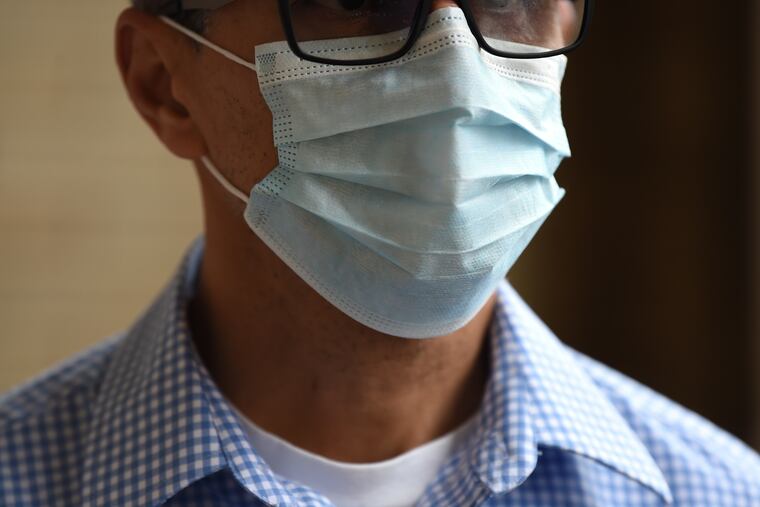Surgical masks become fear-informed fashion | Elizabeth Wellington
Surgical masks — once something you’d see only doctors wear — have become a common sight. But they're more of a fashion accessory.

News about the coronavirus is changing quickly. Go to inquirer.com/coronavirus for the latest information.
Just as the global panic was rising last week that the new coronavirus was on its way to becoming an epidemic, I was in the emergency room with my dad.
Between fear of contracting the latest strain of the coronavirus — that’s so far infected 24,000 people in China, killed more than 500 there, and stricken a total of 12 in the U.S. (though none in our area) — and this year’s influenza virus, nearly everyone in the waiting room was wearing a surgical mask. We’re talking doctors, nurses, patients, and most of the visitors.
Surgical masks — once something you’d see only doctors wear — have become a common sight. And they’ve gotten, well, cute. In the hospital waiting room, some were pink. Most were blue. But sprinkled into the mix were a few animal and camouflage prints as well.
As I returned back to work this week, I spotted more than a few people wearing mint green masks as they scurried through Center City on the way to work. A woman dipped into my office elevator on Tuesday wearing a cool leopard print mask.
Fear is driving the current run on masks. “Our suppliers have been sold out," said Demaris Lugo, a saleswoman at All Care Medical Equipment. She sold me a blue mask from a box of 50 for $3. It was one of just a few boxes she had left. “And it doesn’t look like they are getting any more until March, late March. When we run out, we run out.”
But the irony is that, according to the Centers for Disease Control and Prevention, most surgical masks aren’t effective at stopping coronavirus, or any virus for that matter, from spreading.
“The CDC does not currently recommend the use of face masks among the general public,” reads the most up-to-date FAQ on the agency’s website. Health professionals suggest good, old-fashioned hand washing, covering sneezes, and staying home when you are sick as the best way to keep oneself virus free.
So, if we are being honest with our germophobe selves, surgical masks — even those without knock-off Louis, Gucci, or Chanel prints — aren’t going to protect us. But they are becoming a trendy accessory, whether the motivation is fear or fashion.
Even before this current scare, there was some fashion precedence. Surgical masks hit the fashion runways in 2017 when Virgil Abloh introduced the masks into his fall-winter collection Off White. Abloh sold a set three — just three — for $529. They now retail for $95. (Abloh went on to become the artistic director of Louis Vuitton’s men’s collection.)
Kanye West hid his face behind a bedazzled Martin Margiela mask (not recommended for surgery) during his Yeezus tour. By 2017, rappers Ayo and Teo were making surgical masks popular to the alternative hip hop crowd.
Medical masks on the runway? It’s a peculiar phenomenon, but part of a category that seems to be growing: couture takes on utilitarian safety wear. Two years ago, Calvin Klein’s edgy spin-off, 205W39NYC released a collection of orange reflector jackets inspired by city maintenance workers and firefighters. A women’s version of this jacket sells for $1,225 on Farfetch.
Carhartt, the Michigan-based heritage brand company known for its workwear, partnered with fashion brand A.P.C. A basic knit winter hat (which Carhartt retails for $15) sells for $95 at Bloomingdale’s. Worker chic.
Surgical masks may have a similar fashion trajectory: safety chic.
In East Asia, many people don masks when they get sick, or to protect themselves from air pollution (the high-end versions have been called “smog couture”). When another coronavirus, SARS, hit in the early 2000s, masks became even more ubiquitous. Teens have become a market for “cool” masks: different patterns, characters, and even K-pop bands. Their goal is to seem mysterious.
Will the same trend play out here? It certainly looks like it. Abloh’s collection is no coincidence.